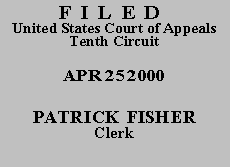

| UNITED STATES OF AMERICA,
Plaintiff-Appellee, v. JORGE ZAMUDIO MADRIGAL, Defendant-Appellant. |
|
In 1993, Jorge Zamudio Madrigal was convicted of possession of a controlled substance with intent to distribute, in violation of 21 U.S.C. § 841(a), and he was sentenced, inter alia, to a prison term of 121 months, which he is currently serving. His conviction was affirmed on appeal. See United States v. Madrigal, 43 F.3d 1367 (10th Cir. 1994). On November 25, 1996, he filed a motion pursuant to 28 U.S.C. § 2255 challenging his conviction and sentence on the basis that he was denied his right to the effective assistance of counsel at trial. The government responded, and the case was referred to a magistrate judge, who issued a report recommending that the motion be denied. Finding Madrigal's objections to the magistrate judge's report unpersuasive, the district court adopted the report and denied the motion. Madrigal now requests a certificate of appealability under 28 U.S.C. § 2253 so that he may appeal the district court's decision.
Madrigal requests a certificate of appealability on the issue of ineffective assistance of counsel. He also contends that the district court denied him his due process rights because it failed to hold an evidentiary hearing. Madrigal has not presented any argument in support of his claims in his application for a certificate of appealability or opening brief. Instead, he simply conclusorily contends that his counsel was ineffective and he was improperly denied an evidentiary hearing and attempts to incorporate by reference the arguments he made in the district court. That is not proper appellate procedure; we do not allow district court arguments to be incorporated by reference. See Gaines-Tabb v. ICI Explosives, USA, Inc., 160 F.3d 613, 623-24 (10th Cir. 1998). In any event, we have considered the arguments he raised in the district court and conclude that he has not made the required "substantial showing of the denial of a constitutional right." § 2253(c)(2).
The application for a certificate of appealability is DENIED, and the appeal is DISMISSED. The mandate shall issue forthwith.
Entered for the Court
Circuit Judge
*. This order and judgment is not binding precedent, except under the doctrines of law of the case, res judicata, and collateral estoppel. The court generally disfavors the citation of orders and judgments; nevertheless, an order and judgment may be cited under the terms and conditions of 10th Cir. R. 36.3.